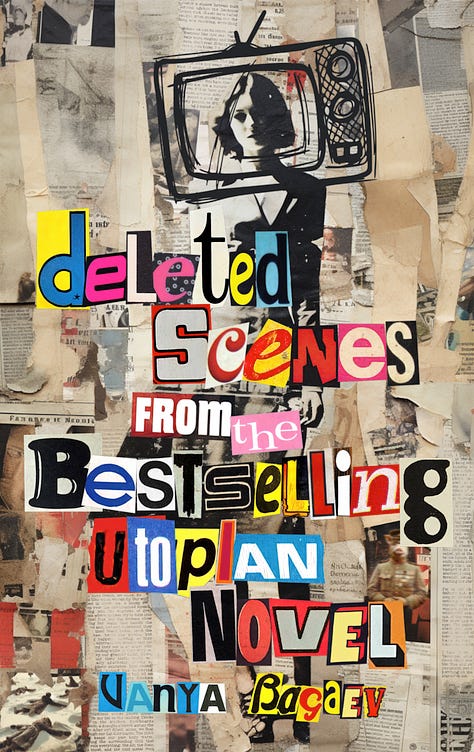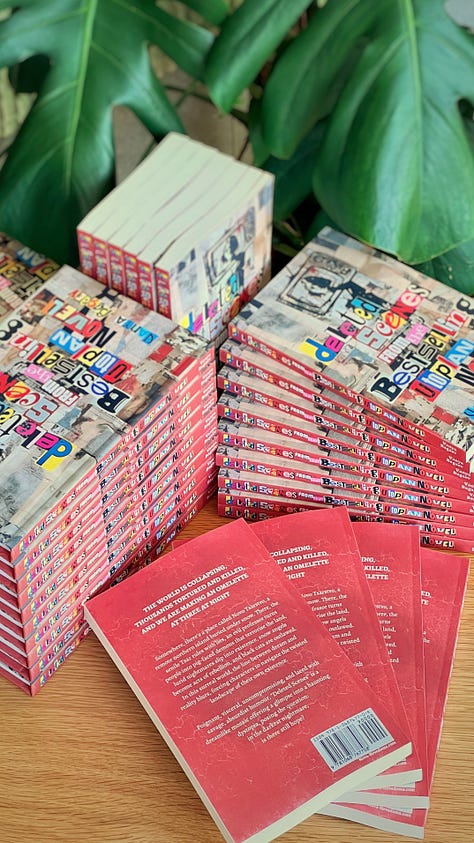Notes on Being Licked
as well as on truth-seeking, semantic alienation, and evil tongues
The world either sits silent or mumbles monologues. What sort of tongue is this? What sort of tongue is slithering into my ear, gliding along the shell and worming its way inside? It writhes between my brain fold, commits its indecencies, and I forget what I was thinking about. Right now, to put it mildly, I've got other things on my mind—there's a bloody tongue in my brain.
—Have some decency,—I whisper, clutching the armrests of my chair.—I don't even know you.
—Mmgh-hmm-uh-mm,—it mumbles unintelligibly.
—Could we at least not do this in public? It's a cinema. Let's finish the film.
—Ughm-hmm.
—What on earth are you finding in there!
—Mmgh-hmm-uhh.
—I'll scream now,—I say, barely audible, but only roll my eyes. There, behind the lids, as if behind stage curtains, the remnants of the ongoing film flicker like a shadow play, its content refusing to settle in my head.
In Chekhov's plays, communication is built on misunderstanding, misapprehension, awkwardness, and the inability to continue one's interlocutor's line. Just as in life. A character isn't the playwright; how's a character to know what her conversation partner means, what's on his mind, or what to say at all? We're here to be together, to look each other in the eye if we dare, to share joy and sorrow, not to logically complete each other's lines, are we? Everyone has their own dialogue scheme in their head, and each is more likely to continue their previous line or blurt out the next thing that comes to mind, but never fall victim to the logic of narrative. Who needs that rubbish anyway?
—Yes, time marches on,—said Lopakhin.
—Who?—inquired Gayev.
—Time, I say, marches on.
—It smells of patchouli in here.
—I'm off to bed. Good night, mum,—said Anya.
—My precious darling. Are you glad to be home? I still can't believe it,—said Ranevskaya.
—Farewell, uncle,—Anya added and left.
Everyone's in their own little world. All are keen on each other but tongue-tied, though they try their hearts out.
One wants to make a clever remark about the individuality of reality and how each individual exists in their own layer of it, without any solipsistic pretensions or postmodernist japes, but the very word "reality" already seems too naff for this, in its metaphysical sense, too saccharine, too mothballed, worn to threads, past it for further use due to its metaphorical death. Some kill gods, I kill reality itself. Everyone has their own mythology, their own episteme and doxa, their cosmæsthesis, as Heraclitus said (or didn't).
Language isn't just words and their formal meanings, but the understanding and absorption of these words, myths, memes, metaphors, symbols—structures that paint a picture of the world, structures from which Truth is cobbled together, though lately it's been having trouble with that. The whole world now is like one massive Chekhov play, only people aren't moping about, grumbling about the weather, philosophising about death or knocking back vodka, but running about like headless chickens, shouting at each other, calling each other fascists, commies, libtards or whatnot—words with clear formal meanings that all have become none but political slur. There's no Big Brother, no Orwellian Newspeak, but an utter understanding of terms in one's own way, with one's own mythology, meme, metaphor, with one's own matrix of psychocosmos.
I leave the cinema, take out my phone, bring it to my ear. There's still a phantom tongue in that ear, so I bring it to the other.
—Hello… The film was awful, couldn't watch it, couldn't understand anything, felt like they'd turned on ten audio tracks at once, in a word—complete Dolby Digital.
—Well, the reviews were mixed. That bad, was it?
—Someone stuck their tongue in my ear during the screening.
*pause*
—Are you having a laugh?
—Was worried evil tongues might whisper something nasty. But it worked out alright.
—Fancy that… Nothing pointed that way…
—Tell me about it… The sensations were, shall we say, mixed as well…
*pause*
—Lovely and sunny here, though it's late November…
—Has all the snow melted, then?
—They say winter will be cold.
—Right, must dash, drop me a line later. Reception's rubbish.
Slushy all around. A light autumn draught blows. Tinnitus drones in my ear. A manifestation has gathered in the square. A lively trio of speakers simultaneously deliver speeches. Among those gathered wanders the spectre of pluralism, seeking dialogue. The demonstrators' weather-beaten faces show neither secrecy nor cunning, just complete and utter befuddlement. Dialogue sneaks about, lost, while the ruffled lot wave the vagrant off to all four winds. They stand, whispering.
—Look, one must approach understanding this question sideways,—says someone important-looking, wearing glasses.
—What do you know about understanding?—says someone looking more important, but without glasses.—Define "understanding".
—In the war of mice and frogs, the frogs are definitely to blame. They drowned the mouse,—continues the first.
—The mouse drowned itself. It was a provocation,—interjects the second.
—No love lost for these parasites…—a third voice says.
—Parasites! Scum! Dregs!—the children squeal.
—Zeus didn't send enough lobsters.
—Zeus shouldn't have anything to do with this. Zeus has enough on his plate. Try feeding all those children!
—Bastards!
—Bastards! Bastards!—the crowd echoes.
—Should've thrown a thunderbolt and been done with it.
—Homer would never have written such thing.
—Of course, that was Lucian of Samosata.
—You want to stop reading fanfiction.
—You want to stop writing it. It was Homer, end of. Homerically funny, not the Iliad but the Idiocy…
—Well, you're a right retard, mate. Absolutely bonkers. Learn some history, then we talk.
—Get 'em out of here! Eleet!
—Bastards! Bastards!
—Homer didn't write it like that… "He who stands between warring sides always remains, as between two millstones…"
—About us! It's about us! It's an allegory!
—You're the allegory!
—It's a metaphor!
—"It takes two to lie: one to lie and one to listen."
—Sophist!
—Look who's talking about sophistry!
—Eleet!
—Oi, d'you even know Greek? What are you gawping at?
—I'm not interested in Batrachomyomachia at all. Reckon it's got naught to do with me. I just came to feed the pigeons. You know, you shouldn't feed 'em bread. Better pff with special seeds.
—Breeding parasites, you twat!
—"Quickly all common evil becomes personal grief…"
Above the square, murmurations of maculatures take wing. The rain intensifies, the demonstrants start grumbling, open their umbrellas and transform into one large black mushroom. I wrap myself in my coat and quicken my pace. Something squelch under my foot, and before you could question free will I find myself lying in a puddle, next to a water-bloated book titled "On the Epidemics of Semantic Alienation"…
Society is a community that operates according to common rules (thus I philosophise at home; naturally dried off, washed, having proper tea; necessarily with milk, how else? I'm in England, aren't I?). People always see those who think in different coordinate systems not simply as mistaken, but as something unfathomable or menacing. Rules must be agreed upon, everyone needs to sit together, arrange debates with an arbitrator, necessarily with an arbitrator, for in civilised argument there must always be an arbitrator, and decide what Truth is, or, given the impossibility of describing the divine, at least decide what Truth certainly isn't. Take paper, ruler, an HB pencil, rule out an Escher-like system of meaning-making, with its internal logic and moral-ethical coordinates. For without this, there's nowhere to go but mutual distrust and cognitive-emotional isolation—even between family and friends. Cheers to Nietzsche for deicide, to Prometheus for postmodernism.
Here's how it used to be: you'd rise an hour before dawn to the snoring of roosters, arch your back, drink a bucket of spring water in one go. Darkness, pitch perfect. The settlement slumbers. Well, you'd reckon, I fancy some Truth, to taste it, so much that it makes one shiver. With such a request, you go to pay respects to the local magus.
He'd stand there, a film over his eyes, baring his teeth in pleasure of meeting you, early though it may be, bearded as a chort, staff instead of a cane.
—Thee again, cheeky beggar?
—Greetings, magus. I be that I be.
—The usual?
I'd nod, cheeks red, coy all over. The magus would smile.
—We'll sort thee right out. The usual, proper job.
Then he'll brew a concoction from fly agaric mushrooms, magical herbs, fireweed, and whatnot, lead me to a room, leave the door open—just in case, you never know.
I'll bring the bowl to my lips and slurp it down like an oyster. Bitter as anything, but the taste buds are used to it. Vision will open up, darkness will disperse, the universe will begin to moo.
Endless tongues will crawl from everywhere. They'll whisper words in languages unknown and known and envelope my hearing. In slow movements, they'll begin to lick the ears, the face, caress, tickle the limbs, creep into various holes, cover the skin in cool saliva that makes you shiver, tremble and drown in feverish arousal.
And so, for hours, the tongues will wind around, wrapping my body whole, just like a mummy in a dark damp tomb.
If you like my work, you may like my book, “Deleted Scenes from the Bestselling Utopian Novel”, which is my best and most personal work to date.
"Deleted Scenes" is a surreal, experimental dystopian narrative set in the remote, snow-covered island of Novo Tsarstvo, uncanny reflection of contemporary Russia. Through a mosaic of perspectives, the author explores the lives of ordinary people struggling under a totalitarian regime where reality blends with nightmares. The novel combines psychological horror with dark humour to examine themes of truth, violence, and freedom, while showcasing the resilience of the human spirit in the face of oppression.
Should you be interested, the book is available worldwide as softcover, hardcover, or ebook at all major retailers, including Amazon, Blackwell (discounted price!), Waterstones (UK), Foyles (UK), Barnes & Noble (US), Hugendubel (DE), Kobo (ebook).
You can also read (or leave) fresh review here and on Goodreads and take a look at the collection of complementary essays here. To get a taste of the book, you can read one of the stories, "Dream" for free on my website. The book is already sold ~85 copies. It’s not nothing, mind you!
If you want to read the book but have any trouble getting hold of a copy, including financial, please reach out to me. I'll do my best to help!







This is bloody interesting although I don't fully understand it. I will have to come back to it again in a quiet moment.
so good. thank you